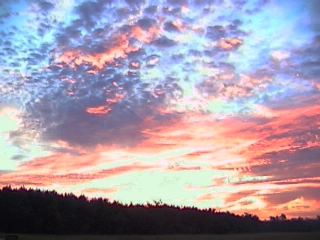MUSINGS
FROM THE MARSH
Ann
Woodlief
VII. The "Folks"
Here on the Middle Peninsula of Virginia, it was the potential for wildness, for the opportunity encounter nature relatively (a key word!) untouched by humans, that first lured me to the marsh. But it was the human, not animal neighbors, who persuaded us, especially my husband, to build and settle here.
Human encounters here in the country have proven quite different from those in the city and suburbs. Though we are "come heres," we have never really felt that we were strangers. We may be miles from any town, but we have found a special sense of community here, one increasingly hard to find in the city.
We first noticed this community with the "country salute." That's the nod and lifting of the index finger or hand on the steering wheel-sometimes with a smile-when two vehicles pass on a narrow country road. This is only one example of how you don't need to exchange names to say "Howdy, neighbor" here.
Every transaction has become a personal encounter between people of good will, often with a little personal story to share. Names are not required; respect and friendliness are. No one ever seems to be in too big a rush to chat a bit. We're on country time.
One thing we have noticed is that racial and class tensions so often evident in the city seem much less here. Maybe it's the good old Southern friendliness that's so often lacking in the city today, but I think it goes beyond that, to long-standing friendships and tolerance.
Even Wal-Mart and fast-food restaurants offer a more human experience in the country, even if it means you are stuck in line a bit longer while the cashier and the person in front at chatting. I confess, eavesdropping has become one of our greatest pleasures, and sometimes we are welcomed into conversations with strangers.
We don't need yellow pages-we just ask the guy at the local hardware store, the librarian, the waitress, or a neighbor, and we get trustworthy personal information and recommendations whenever something needs to be done. Sometimes the best workers don't advertise anywhere, but they aren't so hard to fine-just ask around.
People choose to live here for many reasons-the beauty of land and water, family ties, privacy-but convenience is rarely the draw, as it is in the city. Few people live close to their work unless they farm. They have deliberately chosen to live in this place, and that makes a difference.

One evening, at a Christmas party with neighbors, I mentioned a spectacular sunrise I had seen several mornings earlier. Half the people there said they had also watched it. Imagine-five families up at 6 a.m., looking to the east to watch the sun rise over our shared creek! Then we started comparing notes on what kinds of unexpected visitations of wildlife we'd had recently. It was a lively party.
The human life in the country is every bit as interesting and unpredictable as the wildlife. Nice weather often sends us down the road to explore one of the towns within a half hour or so. Each town has its own special character, shops, and restaurants, as walking around and chatting with folks soon reveals. West Point, Urbanna, Deltaville, White Stone, Gloucester courthouse, Williamsburg-each is a different world, and the drive is almost as interesting as the destination.
That said, we must work a bit harder to know just what is going on or where we might like to visit. This is an area of many counties and small towns, and each has its own little newspaper, perhaps a weekly, where the distinctive heart and pace of that place is revealed. One must be diligent to know just what is going on. Local television news won't tell you about the concert at the new West Point arts center, or how you can join the orchestra (string-players particularly desired). It won't even tell you about decisions being made about your county taxes, or-blessed denial-details about the most recent crimes in the area (no daily body count!), unless they are particularly gory.
Once a friend with a weekend river house told me that when he crossed the Mattaponi River into the Middle Peninsula, he felt a wave of physical and psychological relief, a restoration of human wholeness lacking in the city. Of course, he was a bit of a romantic, and the present West Point bridge construction has complicated this experience, but he had a point.
After more than a decade here, I say, "so far, so good, friends. I may not know many of you by name, but I have come to know your spirit and friendliness, and you rarely disappoint me. Please don't lose that."
Pleasant
Living Magazine, May/June 2006